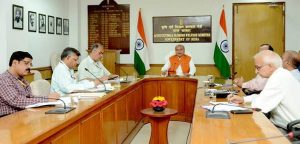 PIB Delhi – An Inter-Ministerial meeting under the co-chairmanship of Minister of Agriculture and Farmers Welfare, Union Minister of Environment, Forest and Climate Change and the Minister of Fisheries, Animal Husbandry & Dairying on the issue of Parali Management of crop residue burning in Delhi NCR, was held today. Discussions were held regarding status of implementation of the respective action plans of the NCR States and NCTD, utilization of machinery for in-situ and ex-situ management, extensive use of bio-decomposers for in-situ management of paddy straw, arrangement for supply of paddy straw to various industrial, commercial, bio-energy and other applications, facilitation of farmers, aggregators, manufacturers, entrepreneurs for setting up of paddy straw baling / raking operations, storage, pelletizing and transport infrastructures, co-firing in Thermal Power Plants (TPPs), using non-basmati Parali as Fodder in Fodder deficient areas in Gujarat and Rajasthan among others. Monitoring and control action taken by States on the reported fire incidences etc. were also discussed.
PIB Delhi – An Inter-Ministerial meeting under the co-chairmanship of Minister of Agriculture and Farmers Welfare, Union Minister of Environment, Forest and Climate Change and the Minister of Fisheries, Animal Husbandry & Dairying on the issue of Parali Management of crop residue burning in Delhi NCR, was held today. Discussions were held regarding status of implementation of the respective action plans of the NCR States and NCTD, utilization of machinery for in-situ and ex-situ management, extensive use of bio-decomposers for in-situ management of paddy straw, arrangement for supply of paddy straw to various industrial, commercial, bio-energy and other applications, facilitation of farmers, aggregators, manufacturers, entrepreneurs for setting up of paddy straw baling / raking operations, storage, pelletizing and transport infrastructures, co-firing in Thermal Power Plants (TPPs), using non-basmati Parali as Fodder in Fodder deficient areas in Gujarat and Rajasthan among others. Monitoring and control action taken by States on the reported fire incidences etc. were also discussed.
MoA&FW made a brief presentation on the actions taken by DoAH&D for Management of Crop Residue Burning. He highlighted that the status of Parali management in Haryana is significantly better than that in Punjab. 9 out of 22 districts in Punjab and 4 out of 22 district in Haryana are major contributors of stubble burning in these states. So, these 13 districts need to be focused upon more. Sangrur, Moga, Tarn Taran and Fatehabad are among them. Till 15th October, the trend for fire events was less as compared to last year but now it has started growing rapidly, especially in Punjab. Early harvesting is the reason for high fire counts in Amritsar and Tarn Taran. It was also apprised that the coverage of land for the application of Pusa decomposer is less in Punjab which needs to be promoted and enhanced. Representative of Ministry of Power informed that it has mandated 5% blending of biomass pellets with the coal for co-firing in Thermal Power Plants (TPPs). The co-firing also helps to prevent CO2 emissions. Till now, 0.1 million MT CO2 emissions have been prevented. Chairman, CAQM informed that they have prepared a detailed framework for in-situ and ex-situ management of parali and the States have been advised to implement the same to contain stubble burning. It was mentioned in the meeting that in spite of several meetings and efforts by CAQM, the steps taken by Punjab are inadequate. It was mentioned in the meeting that one of the main concerns is the delayed delivery of CRM Machines in Punjab and Haryana. The NCT of Delhi and NCR States are expected to utilize the funds effectively and for the maintenance of the provided CRM machines. Pusa decomposer application needs to be promoted.
A proper supply chain management also needs to be developed by the States for utilization of pellets in TPPs. For reducing the paddy straw generation, promotion of basmati variety and crop diversification are effective ways to reduce the menace. The State’s Comprehensive Action Plans to curb air pollution need to be strictly implemented. There must be a coordinated ecosystem for collection, aggregation, storage and transportation of the paddy straw for effective ex-situ management of parali, as discussed in the meeting. It was informed that efforts of ISRO and MoA&FW have helped to get the accurate data on co-firing by TPPs. Chief Secretary, Govt. of Punjab was asked to enhance the application of Pusa decomposer and control the increasing rate of Active Fire Events in Amritsar and to ensure 50% reduction in cases of Active Fire Events in the State in comparison to last year. Chief Secretary, Govt. of Haryana reported a 55% reduction in Active Fire Events in the state in comparison to last year. With the help of Remote sensing monitoring and experts from Haryana Agriculture University (HAU), the farmers are being trained about the desired farm practices and prevention of stubble burning. Chief Secretary, Govt. of UP was advised to carry on with their positive efforts and ensure maintenance of progress achieved so far in the field of parali management. Chief Secretary, NCT of Delhi informed about the increase in the coverage of land area under Pusa application coverage. Minister of Fisheries and Animal Husbandry & Dairying mentioned that there is a shortage of fodder in various part of the country and suggested that an efficient system is essential to be developed for transportation of the stubble available in NCR region to the fodder deficient regions. Minister of Agriculture and Farmers Welfare further informed that an event on Pusa decomposer application is being organized on 4th November 2022 for educating the famers about the details. The event is likely to include an open discussion with the scientist of ICAR.





